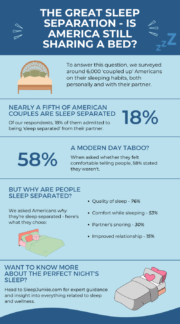How Long Do Dreams Last?
Dr. Nayantara Santhi, PhD
Dr. Nayantara Santhi is an associate professor of psychology at Northumbria University in Newcastle. Santhi’s body of work includes numerous articles on how circadian rhythms regulate an individual’s sleep-wake cycle. Santhi’s articles have also focused on related elements such as bright light exposure and melatonin production.
- Despite studying dreams for years, we still don’t fully understand why they happen or their exact purpose.
- Dreams predominantly occur during REM sleep, but simpler dreams can also happen during NREM stages.
- While everyone dreams, not everyone remembers their dreams and factors like sleep deprivation can impact dream recall.
Dreams have a way of distorting your sense of time. An adult can dream between four and six times a night, and every dream lasts between 5 and 45 minutes. Some estimates suggest we dream for only 90 minutes a night.
There is no way to determine if a person is sleeping apart from our bodily responses while at rest: rapid eye movement, an increase in heart rate and blood pressure, quick shallow breaths, fluctuating body temperatures.
In this article, we discuss the sleep cycle and when you dream. We also explore why we don’t remember our dreams and why we dream.
What is a Dream?
For the sake of clarity, when we say the word dream, we’re referring to the vivid dreams people experience during REM sleep or Rapid Eye Movement where the body is paralyzed, but the brain remains relatively active.
The truth is, we don’t know why we dream.
There is Sigmund Freud’s theory of dreams, which suggests dreams are our brain’s way of warning us of something going on in our real lives. A recurring bad dream could indicate there is something wrong in your real life, and different dreams with recurring themes can show a subconscious desire, motivation, or thought.
Mostly, you shouldn’t worry about recurring dreams; however, recurring negative vivid dreams can cause sleep deprivation and other health problems such as day time sleepiness, mood problems, not wanting to sleep, suicidal thoughts, or suicide attempts.
Psychology Today states some scientists believe dreams exist to “process intense emotion” or consolidate a day’s information and store it for long term memory. Calvin S. Hall, Ph.D., collected over 50,000 dreams from college students and determined it was common for a sleeper to experience intense emotion when they dream.
Sleep Cycle
Sleep cycles last about 90 minutes. An adult should get about five to six sleep cycles a night for a total of seven to nine hours of sleep.
In a sleep cycle, you go through three NREM (or non-REM) sleep stages before getting to one REM stage of sleep, which is when you typically dream complex ideas, though simpler dreams in NREM sleep are possible.
“While dreaming is a universal human experience, we still know little about how and why we dream,” says Dr.Nayantara Santhi. “Of course studies looking at brain activity during dreaming are beginning to offer insights. During the early stages of dream research, it was thought that dreaming occurred only during REM sleep, but we now know that it also occurs during NREM sleep.”
The first stage of NREM sleep takes place a few minutes after falling asleep and lasts for about five to ten minutes. During this stage, your eye movement will slow, and your body will fall into a relaxed state. Stage one is the light form of sleep. Quiet noises, movement, and bright light can wake you.
During the second stage of NREM sleep, you are harder to wake. You could come back to alertness if you were to hear a loud noise, although you would wake up feeling drowsy. During this stage, your brain activity slows down.
The third stage of NREM sleep marks the beginning of deep sleep. Your eyes are still, your muscles are inactive, and you won’t respond to stimuli within the room, making it harder to wake.
REM sleep makes up 20 percent of our sleep. REM sleep can last between 5 and 45 minutes, with each REM cycle longer than the last. Lauri Quinn Loewenberg, a dream expert and author, said, “The first dream of the night is about five minutes long, and the last dream you have before awakening can be 45 minutes to an hour long.”
A sleeper in REM sleep won’t wake easily. Your muscles and eyes do not move during this stage, although your body is working to repair tissue damage.
Dream Recall
We dream as we sleep, yet some people remember their dream better than others— about 95% of sleepers forget their dreams. Sleep deprivation can greatly influence how much of your dream you remember, as lack of sleep decreases the time spent in REM sleep.
Interesting Facts About Sleep
- Blind people may experience visual imagery in their dreams.
- The paralysis experienced during REM sleep may carry over into wakefulness, particularly if a sleeper is suddenly awakened. While this sleep paralysis is normal during REM sleep, it’s considered a disorder when it persists outside of it.
- Many of the same kinds of dreams are experienced by people from different walks of life and cultures. People often dream of someone chasing or attacking them, falling, arriving late, or flying.
- Some people become aware that they are dreaming. This is called lucid dreaming, which is when the sleeper is caught in a brain state between REM sleep and wakefulness.
- Daydreaming is a real thing. REM sleep isn’t needed—just an active imagination and contemplation.
Conclusion
There are more theories about dreaming than there are facts. If you can’t remember your dreams but want to, we suggest going to bed with a sleep journal on your bedside table and focus on getting good sleep; however, there’s a chance you won’t remember all your dream content as you can have an average of four to six dreams in a single night.


